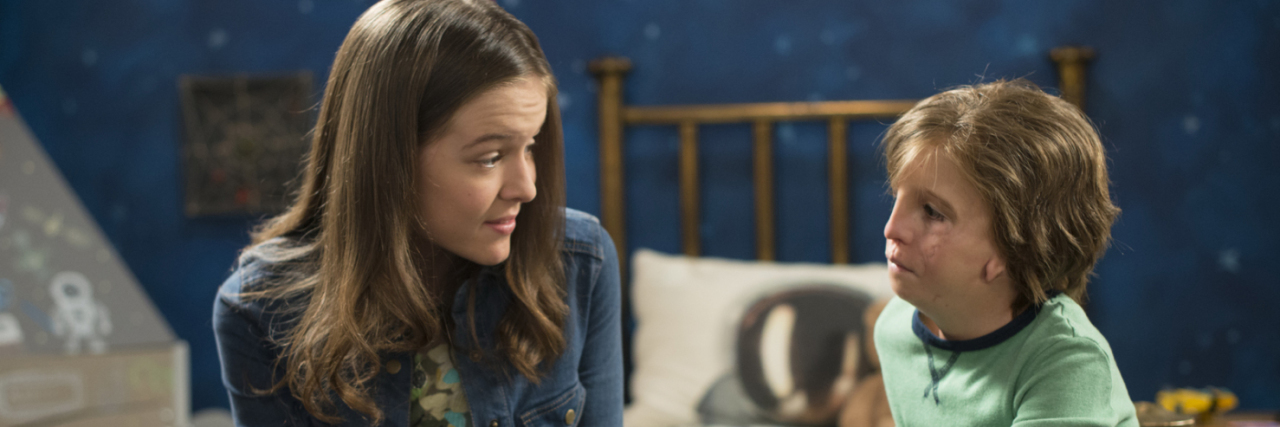What I Love About 'Wonder' as the Sibling of Someone With a Disability
I’d like to raise a glass to the creators of “Wonder” for capturing through fiction the essence of what governs many nonfiction lives: the sibling experience.
“Wonder” is a sweet film (and book) about a boy named Auggie who was born with facial differences. We tail Auggie as he navigates his first year in public school. Before long, we learn the story is just as much about the people who closely orbit his world as it is about him. He’s not going it alone; behind this boy is a motley cast of individuals who help shape his emotional contours and coexist with him in a meaningful way.
Enter Via. Via (short for “Olivia”) is Auggie’s high-school aged older sister. As if instinctively, she nuzzles up to her brother in the nebulous space between sibling, friend and caretaker. She is perceptive, restrained and mature for her age. But we can see her turbulent heart.
I fell in love with Via and her turbulent heart.
Supporting characters rarely get an introduction and often operate in the plot periphery, but their presence has a palpable weight. At worst, they complicate otherwise clean storylines, stay small so others can be big, and reckon with never winning gold. At best, they add nuance to the narrative, open our eyes to relevant context, and challenge our instinct to follow narrow interpretations. Almost always, we stay focused on the protagonist’s development and take these supporting characters for granted. It’s inadvertent. We mean well.
Have you ever felt like the supporting character in someone else’s movie?
Siblings of individuals with intellectual or physical disabilities, serious chronic or life-threatening illnesses, neurological, mental or chromosomal disorders, or any other special need or circumstance are some of our best off-screen supporting characters.
I know because I am one.
It feels foreign to praise and draw attention to myself. Via would agree: we sisters simply do not do this. But this is why I loved “Wonder;” it peeked into the sibling experience without overindulging. Via is depicted as a teenager who is coming of age and finding her voice amidst the unspoken demands of being Auggie’s older sibling and her family’s established hierarchy of needs. She is everything we would want in a sister for him, but we can sense that she feels muffled.
Fortunately for us, “Wonder” lurches you out of Auggie’s world and into her private headspace — often through her own words:
“[O]ur family was like the earth and it always revolved around the sun. Auggie is the sun. My mom and dad and me are the planets orbiting the sun.”
Noiselessly she dances in circles around her brother’s needs — the hills she climbs alone frequently overshadowed by the mountains Auggie faces:
“Mom and Dad said I was the most understanding girl on the planet. I don’t know about that. I just know they couldn’t take one more thing on their plate.”
Partway through, we see Via’s hurt unfold as anger. But even her anger is quiet and docile.
I fell in love with Via because her tender, bursting, generous heart is sheathed by scar tissue.
The best ones are.
The reality is that in a family like Auggie’s, everyone loses, yet everyone wins. Maybe this doesn’t make total sense, but it does if you’ve lived the experience.
Via isn’t the only one who foregoes some of her needs. Auggie himself faces the world with a different canvas, and their parents gasp for air while treading deep, unknown waters. For every individual, hopes will be dashed and needs will go unmet. Each person learns how to endure in a perpetual state of longing. But through this loss of self, each receives the gift of moving through the world with more meaning, perspective and empathy. Ever realize how life-giving oxygen is when it’s not readily available? If it doesn’t break you, it’ll build you.
And like that, millions of families find themselves weaving all the painful, frayed ends of their extenuating circumstance into a joy-filled mosaic that far exceeds the sum of its parts.
So, again, a million X’s and O’s to “Wonder’s” creators for writing a supporting character like Via. Thank you for going beyond one-dimensional expressions of parent-child bonds, or predictably heroic portrayals of dynamic sibling duos. By giving Via a voice, you’ve granted people access to the deeper layers of the family experience that surrounds individuals with disabilities — the layers that lend a beautiful gradation and often go unnoticed.
What a treat it is to feel seen.

